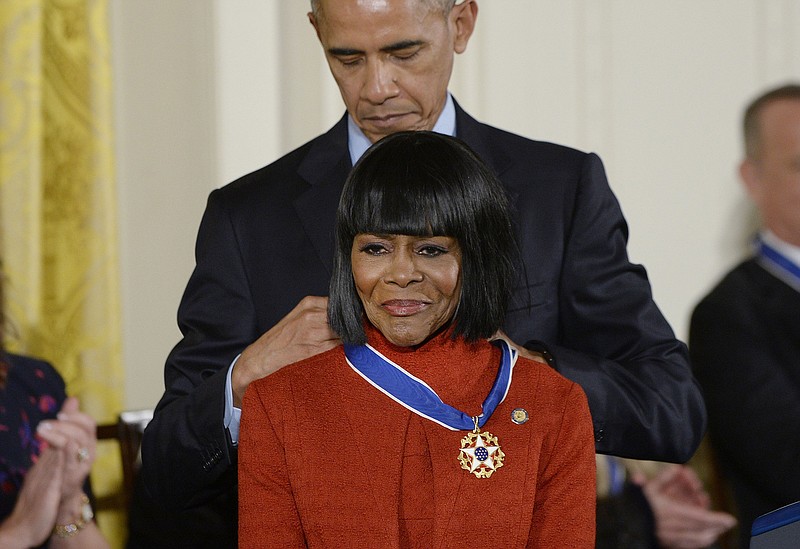A great actor's screen breakthrough tells at least two stories. The triumphant one is about the skill and singularity that got that actor noticed, and led to the big break and the role that makes her artistic possibilities more possible.
Cicely Tyson's, for example.
The other half of any breakthrough story is about the thing that needed breaking through.
In many cases, again and most pertinently with the case of Tyson, who died Jan. 28 at the age of 96, it's the hidden story, the more sobering one. That one tells of obstacles endured, or worked around, while getting and then doing the job: prejudice, sexism, galling pay inequity.
Tyson's first breakthrough lasted a single season on network television, before she was written out of the low-rated George C. Scott CBS drama "East Side/West Side," about social workers in New York. Tyson played a welfare office secretary. She didn't get a lot of juicy dramatic opportunities. But right away you could see her stunning capabilities, even if they were held in check while Tyson delivered, honestly and truthfully, the expository needs of the script.
The actor, a riveting presence in any screen circumstance, was the first Black series regular on television, two years before Bill Cosby breezed to superstardom in "I Spy" and five years before Diahann Carroll toplined NBC's "Julia." In retrospect, "East Side/West Side" never had a chance. Pretty tough fare for the time, it was up against "Sing Along With Mitch," over on NBC. The Mitch Miller variety show was the whitest show in existence, diverting viewers' attention away from the tough issues and progressive casting (propping up its white male protagonist) embodied by "East Side/West Side."
Tyson's real breakthrough came nearly a decade later. Director Martin Ritt's "Sounder" (1972) adapted the Newbery-winning book by William H. Armstrong, about a sharecropping family in 1930s Deep South America. She'd been working toward a role like this for years.
A RESOUNDING SUCCESS
"'Sounder' surprised us all," Tyson said decades later. "I remember Marty Ritt calling me and saying, 'Cis, this is supposed to be a children's film. But if they're not careful' — "they" being the studio heads — 'they're going to make a damn good film.'"
That it was. It was also a commercial success, thereby proving the lesson Hollywood cyclically ignores to this day: That there was, and is, not just room at a white-dominated table but room for more than one table. There was room for a broader, more unpredictable array of images of Black life than audiences were seeing in "Shaft" and "Superfly" and Pam Grier in "Coffy."
I saw "Sounder" when I was 11. For a white kid sitting in a blindingly white audience in a theater in Racine, Wis., this was something new after the usual Disney "Boatniks" and "Million Dollar Duck" time-fillers of the era. The reunion scene in "Sounder," when Tyson's Rebecca Morgan sees her injured, long-imprisoned husband Nathan (Paul Winfield) coming up the road, cut straight to the heart of what screen acting is all about. No strings on the soundtrack, no heavy emotional cues. Just life, captured, by an actor, transcendent. Pure, unvarnished joy and anguish and longing and relief — a mixed chord of brilliance.
You believe this performance, and more importantly you believe it in the period of the story. So many Black-driven films (well, there haven't been so many, really) set in America's past get by with contemporary attitudes and behavior and perspectives, shoehorned into a frame of nostalgia. "Sounder" may be a little soft around the edges, and G-rated, but it's better than that. And Tyson's work remains a towering accomplishment.
AWARDS AND ACCOLADES
Two years later I saw "The Autobiography of Miss Jane Pittman" on TV, for which Tyson won two Emmy Awards as the former slave who lives long enough to make her way in the final scene to the whites-only drinking fountain and taste the fruits of her courage. I remember being dazzled by the performance, how fully invested she was, and how easy she made it for those watching that night to be invested, too. Tyson made the many stages of a life feel like, well, real life; she made the material shine like gold.
So much more came later, ranging from "Roots," an even bigger Black TV phenomenon of the 1970s, to the 21st century and the Broadway stage ("The Trip to Bountiful," which got her a Tony Award, and "The Gin Game" with James Earl Jones). To millions, Tyson was best known as Ophelia, the great Viola Davis's formidable mother on "How to Get Away With Murder." A different Ophelia, Shakespeare's, spoke in "Hamlet" of "the steep and thorny way to Heaven." Tyson's path, strewn with obstacles to long-deferred breakthroughs, was something like that, too. But she seized every day, every acting possibility, and late in life, she shone in the light of career achievement awards and richly deserved adulation. In 2016, President Barack Obama presented her with the Presidential Medal of Freedom.
Two days before she died, Tyson's memoir "Just As I Am" came out. In it, the woman born in Harlem in 1924, to West Indies immigrant parents, writes of becoming an actor at the risk of losing her mother's love and approval forever.
She had no choice, she writes. "I wanted to feel as if I embodied our humanity so fully that it made us laugh and weep, that it reminded us of our shared frailties. I want to be recalled as one who squared my shoulders in the service of Black women, as one who made us walk taller and envision greater for ourselves."
